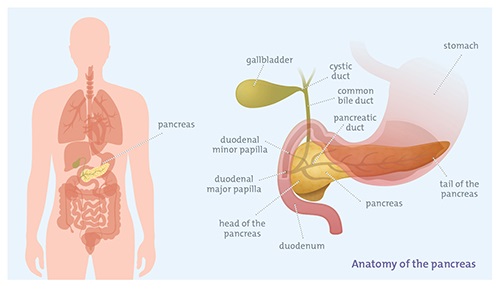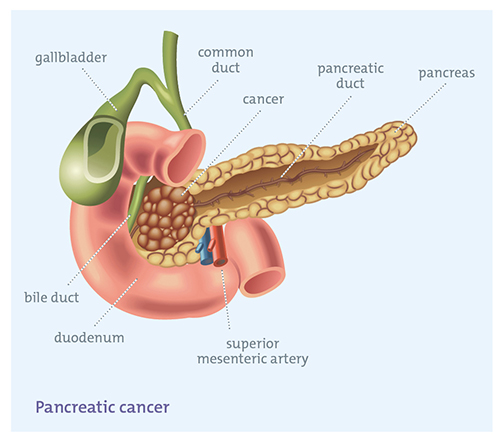 What is the pancreas?
What is the pancreas?
The pancreas is a large, tongue-shaped gland that measures approximately 15 cm long. It sits deep inside the abdomen between the stomach, liver and spleen.
The pancreas comprises of three different sections:
- head – the wide end on the right side of the body
- body – the middle section of the pancreas
- tail – the thin end on the left side of the body.
The pancreas has two important functions:
- Exocrine function – most of the cells in the pancreas are exocrine cells. Exocrine cells produce enzymes released through a duct to help your body break down foods and absorb nutrients.
- Endocrine function – the remaining cells in the pancreas are endocrine cells. Endocrine cells produce hormones, such as insulin, to help control blood sugar levels. You are likely to notice issues with both of these functions if you have pancreatic disease.
 What is pancreatic cancer?
What is pancreatic cancer?
Pancreatic cancer occurs when abnormal cells grow out of control in the pancreas and form a tumour. Although pancreatic cancer can happen anywhere in the pancreas, approximately 70% of cases occur in the head of the pancreas.
The two main types of tumours that develop in the pancreas are exocrine and endocrine tumours:
- Exocrine pancreatic cancer – Exocrine tumours are the most common, accounting for 95% of pancreatic cancer cases. About 85% of these are pancreatic ductal adenocarcinomas (PDAC), which start in the lining of the pancreas ducts.
- Endocrine pancreatic cancer – Endocrine tumours are also known as pancreatic neuroendocrine tumours (NETs) or islet cell tumours. They start in the hormone producing cells of the pancreas and account for approximately 5% of pancreatic tumours.
Watch: What is pancreatic cancer - explained
What is pancreatic cancer?
Download our guide
Pancreatic Cancer Patient Guide
Easy to read information about diagnosis, treatment, diet and pain management in one place
Download our guide
Patient Nutrition Guide
Helpful ways to manage nutrition during pancreatic cancer and treatment

